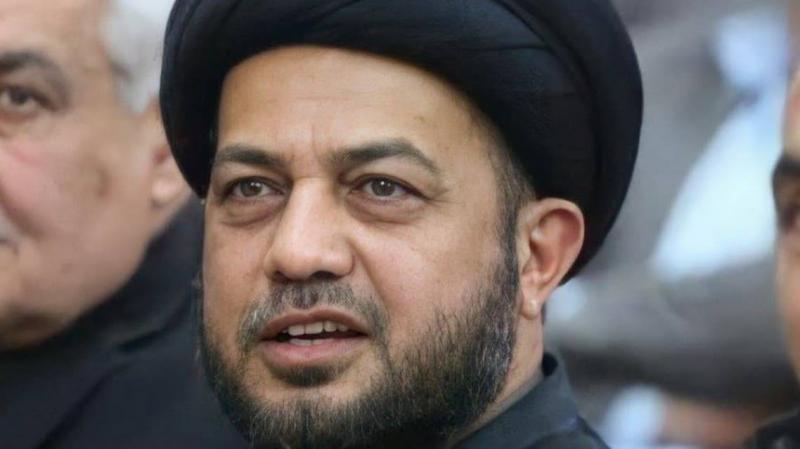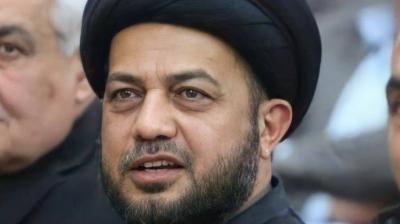Under the title "Iraqi Cleric Sparks Controversy: 'We Reject Loyalty to Foreign Entities!'", the Al-Arabiya website reported that a significant uproar was caused by Iraqi cleric Sayyid Hamid Al-Yasiri after videos of his lecture during this year's "Ashura" season circulated, discussing the concept of "nationalism" and the relationship with foreign entities. During a speech at an assembly a few days ago, he stated: "To receive voices, guidance, and directions from beyond the borders is not the belief of Imam Hussein; we reject these affiliations and loyalties and declare this with the loudest voices. There is no fear or hesitation that can prevent us. Whoever is loyal to anything other than this homeland is a traitor and deprived of the love of this homeland."
Responses to Al-Yasiri, who subtly criticized armed militias loyal to Iran without naming them, quickly followed from the Secretary-General of "Asa'ib Ahl al-Haq," Qais al-Khazali. He posted on his Twitter account a message stating, "It is surprising that such nonsense comes from a cleric on the pulpit of Imam Hussein in the city of Al-Ramitha, known for its awareness and culture."
### City of the Gallant
It should be noted that "Al-Ramitha," a city located in southern Iraq, is renowned for its poets and tribal leaders, as well as its historical role in participating in the "1920 Revolt" against British colonialism and the "Shabani Uprising" in 1991 against the regime of former President Saddam Hussein. Additionally, many of its residents rushed to volunteer to fight against ISIS in 2014, responding to a call from the highest Shia authority in Iraq, Ali al-Sistani. The city is also known for its longstanding relationship with the religious authority in Najaf. In the 1990s, when the highest Shia authority, Ayatollah Abu al-Qasim al-Khoei, faced harassment from the security forces under Saddam Hussein's government, a group of Al-Ramitha citizens stood by al-Khoei, protecting his home and supporting him due to their renowned courage.
### Brigade of Supporters of the Religious Authority
Al-Yasiri is a highly respected figure in Al-Ramitha, which enabled him to gather thousands of fighters who volunteered to combat ISIS. He founded the "Brigade of Supporters of the Religious Authority," which initially was part of the "Popular Mobilization," but faced significant marginalization and pressure, including a lack of funding and resources, and exclusion from important administrative and leadership positions within the Mobilization. This was due to the misalignment of his political orientation with the "loyalist factions" aligned with Iran. This marginalization affected the formations known as the "Supporters of the Religious Authority," which rejected fighting outside Iraqi territory or obeying the orders of Iranian Revolutionary Guard leaders.
It is noted that the armed groups loyal to al-Sistani include: the Brigade of Supporters of the Religious Authority, Abu al-Fadl al-Abbas Brigade, Imam Ali Brigade, and the Ali al-Akbar Brigade. In 2020, they placed themselves under the command of "the Supreme Commander of the Iraqi Armed Forces" to separate administratively from the Popular Mobilization, desiring that their decisions be purely Iraqi without ties to a specific regional axis, and in adherence to al-Sistani's "fatwa." In December 2020, the commander of the Ali al-Akbar Brigade, Major General Ali Al-Hamdani, stated, "Everyone responded to al-Sistani's fatwa, but not everyone adhered to it," adding, "We are the incubators of the fatwa, and those who committed to it and implemented it, while some sought political gains and the like."
### Al-Yasiri's Criticism
This historical background is significant to understand the reasons motivating Al-Yasiri to speak critically against Iran-aligned factions. He is fully aware of the consequences of his statements and aimed to deliver a "very harsh and clear" message to party leaders and "loyalist" factions that despite the marginalization and pressure faced by the "Supporters of the Religious Authority," he would not change his stance, and the Revolutionary Guard would not have authority over him, and his decisions would be Iraqi.
In this context, al-Khazali described Al-Yasiri as one of the "nationalist clerics" attempting to monopolize patriotism to advance their own projects. There is a clear distinction between two projects: one Iraqi that believes national interests take precedence over universal slogans, and another revolutionary that does not believe in borders and believes in the formation of a connected resistance axis.
This divergence is not a trivial detail but rooted in different theological perspectives between Iranian leader Ali Khamenei and al-Sistani, as each has a distinct theological, cultural, and political vision.
### Countercampaign
It is noteworthy that as soon as Al-Yasiri spoke, swift responses came from supporters of the Iran-aligned militias. Some even spread rumors that his endorsement had been withdrawn, a claim that was denied by Iraqi sources to Al-Arabiya, affirming that "Al-Yasiri is respected and valued for the sacrifices he has made." These same sources indicated that "there is a discussion within the Najaf community regarding Al-Yasiri's statements, which though harsh in some expressions, align with the Najaf religious leadership's view that Iraqis' loyalty should solely be to Iraq."
As for al-Sistani’s office, sources affirmed, "Al-Sistani's religious authority does not intervene in such matters and does not take sides in disputes; it certainly differs in its language from that used by Al-Yasiri, but it believes in the substance of his speech concerning the importance of loyalty to the homeland and rejects any commands from outside Iraq that politicians or fighters in the Popular Mobilization might follow."
Ultimately, the anger from Qais al-Khazali and armed faction leaders over Hamid Al-Yasiri's statements found acceptance among a broad segment of Iraqis, particularly the "civil street" and "October" youth, as well as a significant group of traditional religious scholars who do not believe in the "Guardianship of the Jurist."




